Bonnie Brown
Bonnie Brown: Q&A With Former University Museum Director, Albert Sperath
*Editor’s Note: The latest installment in the Ole Miss Retirees features is former Director of the University of Mississippi Museums and Chair of the Ole Miss Faculty/Staff Retirees Association, Albert Sperath. The organization’s mission is to enable all of the university’s faculty and staff retirees to maintain and promote a close association with the university. It is the goal of the Ole Miss Faculty/Staff Retirees Association to maintain communication by providing opportunities to attend and participate in events and presentations.
Albert Sperath, retired Director of the University of Mississippi Museums, also served as the Chair of the Ole Miss Faculty/Staff Retirees Association. He did it all well and Ole Miss benefited from his leadership, artistic talents, and his time here. Although he and his wife Linda have moved to North Carolina, his imprint remains here at Ole Miss.
Brown: Where did you grow up? Please talk about your childhood, parents, and siblings.
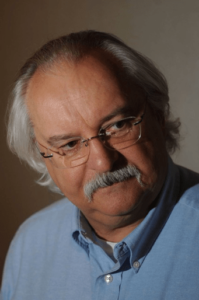
Albert Sperath. Photo provided.
Sperath: My first 14 years were in Philadelphia, Pennsylvania. We lived in a three-story row house in a neighborhood called Fishtown. Then we moved to the country near Doylestown. I have a brother, John who lives in Apex, North Carolina and my sister Susan Springer, lives in Perkasie, Pennsylvania. We are all seven years apart in birthdays. Both my brother and my sister are creative as well. My parents were also both creative. In addition to working, they were model builders. Dad worked as a draftsman at a boat building yard and the company would commission them to make a scale model of the fishing boat just finished to present to the owner after launching. They also made Halloween costumes for me that usually won some kind of award. That environment had an influence on my future as a museum professional and artist.
Brown: Where did you go to school?
Sperath: I received my Bachelor of Fine Arts (BFA) from Ohio University in Athens in 1973. My Master of Fine Arts (MFA) was from the University of Nebraska Lincoln in 1976.
Brown: What subjects were hardest for you in school?
Sperath: Foreign language and chemistry were the most challenging.
Brown: Who influenced your career choice? How old were you when you decided your career path?
Sperath: The GI Bill was crucial in my career. Without it, I doubt I would have attended a university. In graduate school, I watched my peers have a difficult time finding jobs teaching art at the college level. I realized that I should look into another track that involved being in the art world but not as a professor. The Sheldon Art Museum was adjacent to the art building and I heard about a dormant grad assistant position there. I met with Norman Geske, director, and he renewed the position and that began my career in the museum/exhibition world. It was a good choice.
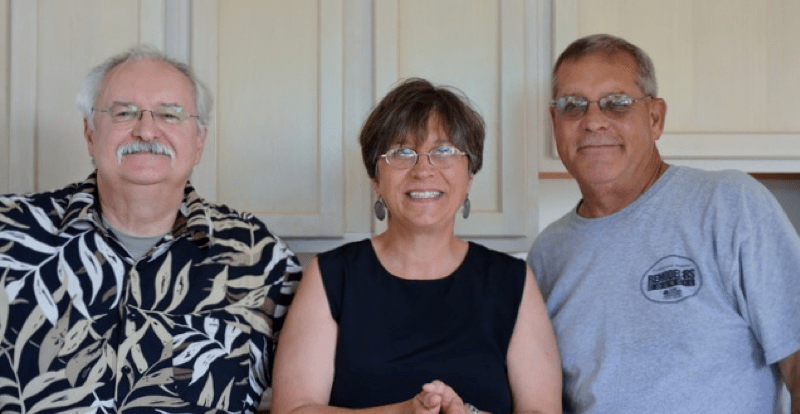
Sperath with his sister Susan and brother John. Photo provided.
Brown: What is the purpose of art in society?
Sperath: To mirror the present. To provide individuals with a way to say something—visual, literary. etc.
Brown: Tell us how/when your Ole Miss “story” began? Who hired you? How long did you work at Ole Miss?
Sperath: In 2001, I was offered the director of the University Museum position at Ole Miss by Dr. Carolyn Staton. Typically those positions go to a Ph.D. so I was surprised to get the offer. And it was at a science, history and art museum, a multidiscipline venue when my career to that point was all in art-related venues. It turned out that I relished the multi-discipline environment and enjoyed the mix of artifacts. After two years in the position, I was asked by Carolyn if I would consider the addition of overseeing Rowan Oak which I accepted. I retired in 2009.
A story about my Rowan Oak experience — I was invited by Dr. Gloria Kellum, then Vice Chancellor for University Relations, to draft a grant request to our congressional representatives to renovate Rowan Oak under a tourism enhancement category. Not being designed to handle thousands of visitors a year, it was showing wear and tear. I wrote a request for total renovation down to reproducing the wallpaper and installing a dry whole house fire suppression system. The request totaled about $1.5 million. The grant was approved and when I got the letter of award the amount was increased to $2 million, I called Carolyn’s office and asked for an appointment. I told her I had inflated the original request a bit because in my experience a grant request often was reduced by the granting agency. I explained that I did not know what to do with the extra half a million. She said we are not giving it back and it was my job to spend the money within the parameters of the granting agency, which I did. Rowan Oak received a much needed total renovation to its original condition and hidden improvements to handle the high visitation of Faulkner’s home.
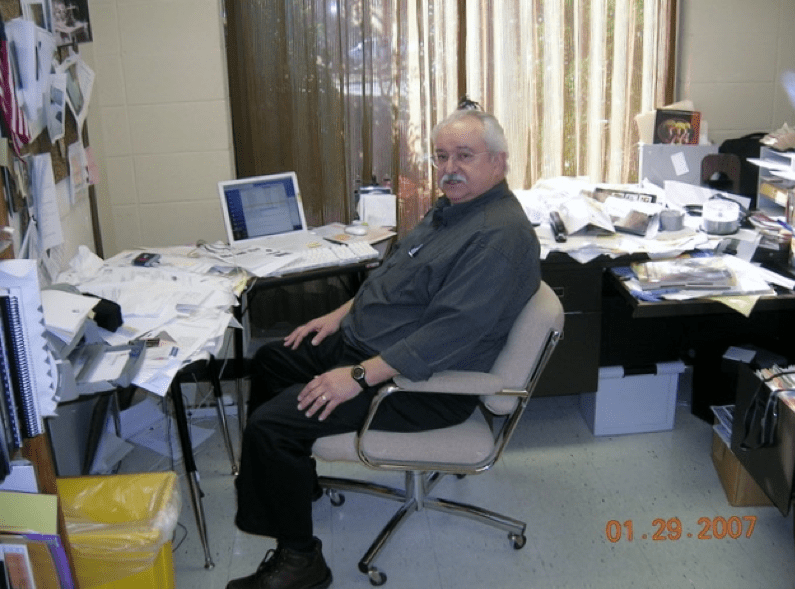
Sperath in his office at the museum. “I really did know where everything was!” he said.
Brown: What did you know about Ole Miss before you accepted a position here?
Sperath: Nothing! But in 2002 when Ole Miss commemorated the 1962 riot over James Meredith’s attending Ole Miss, the museum was an integral part of the event and I learned a lot. The event was called Open Doors and it was a great success. I was very surprised that the enrollment in 2001 was almost the same as the school I had just left. The research environment, however, was one I had not experienced in my academic career to date.
Brown: Describe your most memorable days at work.
Sperath: Most were the days that were not “normal.” For instance, we had a traveling exhibition arrive that had a crate so large it barely fit diagonally through the double doors. And it weighed about 500 pounds. We had to request extra muscle from the University moving staff to help us get it into the museum. One exhibition we hosted received a backlash that was totally unexpected. So much so that there was a serious consideration to close it. We were able to have meetings to discuss the misgivings and the exhibition—with a few tweaks—continued to conclusion.
Brown: What do you consider to be the highlight of your career?
Sperath: In 1995, I discovered a relatively obscure but significant African American artist that was born and raised in Mayfield, Kentucky, just 30 miles from Murray State University where I was the Art Gallery Director. That discovery of Ellis Wilson led to a project that culminated in organizing a traveling retrospective exhibition, a campus seminar on him and his contemporaries, and a book published by the University Press of Kentucky titled “The Art of Ellis Wilson.”
Brown: What accomplishment are you most proud of?
Sperath: I guess it would be that my career helped people better understand our culture.
Brown: I’m sure you have a favorite museum. Which ones are your favorites?
Sperath: That depends on the discipline. The Wolfsonian in Miami is one; The Eiteljorg in Indianapolis is another. The Museum of Anthropology in Vancouver, BC. and the Sheldon Art Museum in Lincoln, Nebraska are two more favorites.
Brown: What chapters would you separate your autobiography into?
Sperath: Childhood through High School; US Navy; University; Art Gallery/Museum; Marriage; Retirement
Brown: What’s the title of the current chapter of your life?
Sperath: What day is it?
Brown: What is the best advice you ever received?
Sperath: At a museum conference I attended a session about public and institutional communication. One of the panelists said a key component of her mode of operation was to not ever say anything bad about colleagues because it would always get back to them.
Brown: What advice would you give to your 20-year-old self?
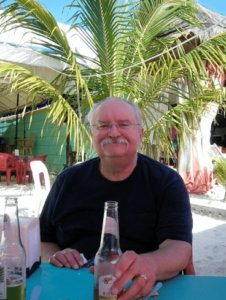
Sperath relaxing in Mexico. Photo provided.
Sperath: Keep your head down in boot camp!
Brown: Tell us something about yourself that not many people may know.
Sperath: I owned a 1962 red Corvette in 1963 with a 300 hp engine, four-speed with positraction. Only for about a year though. I could not afford the gas and upkeep.
Brown: What are some of your personal “rules” that you never break?
Sperath: I am not conscious of them but they include respect, honor, patience, love and more.
Brown: What gives you great joy?
Sperath: Family. Watching nieces and nephews have children and seeing them as they progress through their lives. And some art. There was an experience I had in an art museum where I turned a corner and there was a very large painting facing me and it literally took my breath away it was so beautiful.
Brown: What do you do to relax?
Sperath: Sleep.
Brown: What has become your routine since you retired? Do you have hobbies?
Sperath: When I first retired I bought a 15-foot aluminum Starcraft runabout boat. I spent a year completely restoring it and then sold it. Great experience and it kept me busy figuring out how to do stuff I never encountered before.
I continue to make small sculptures. I carved out a small corner of our garage to create a “studioette” where I can explore.
Our retirement community offers a plethora of opportunities for entertainment, exercise, and adult learning. I serve on the board of the resident’s corporation and am a member of several committees.
Brown: What remains on your bucket list?
Sperath: I do not have a bucket list.
Brown: What do you want your epitaph to be?
Sperath: He tried, he tried, and then he died.
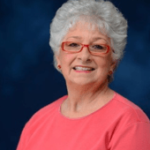 Bonnie Brown is a retired staff member of the University of Mississippi. She most recently served as Mentoring Coordinator for the Ole Miss Women’s Council for Philanthropy.
Bonnie Brown is a retired staff member of the University of Mississippi. She most recently served as Mentoring Coordinator for the Ole Miss Women’s Council for Philanthropy.
For questions or comments, email hottytoddynews@gmail.com.






























cool math games
April 3, 2019 at 8:51 pm
This article has suggested to me many new ideas.
iphongthuy net
April 9, 2019 at 2:41 am
http://sco.lt/7LU5nU
thank you so much
im website: IPHONGTHUYNET